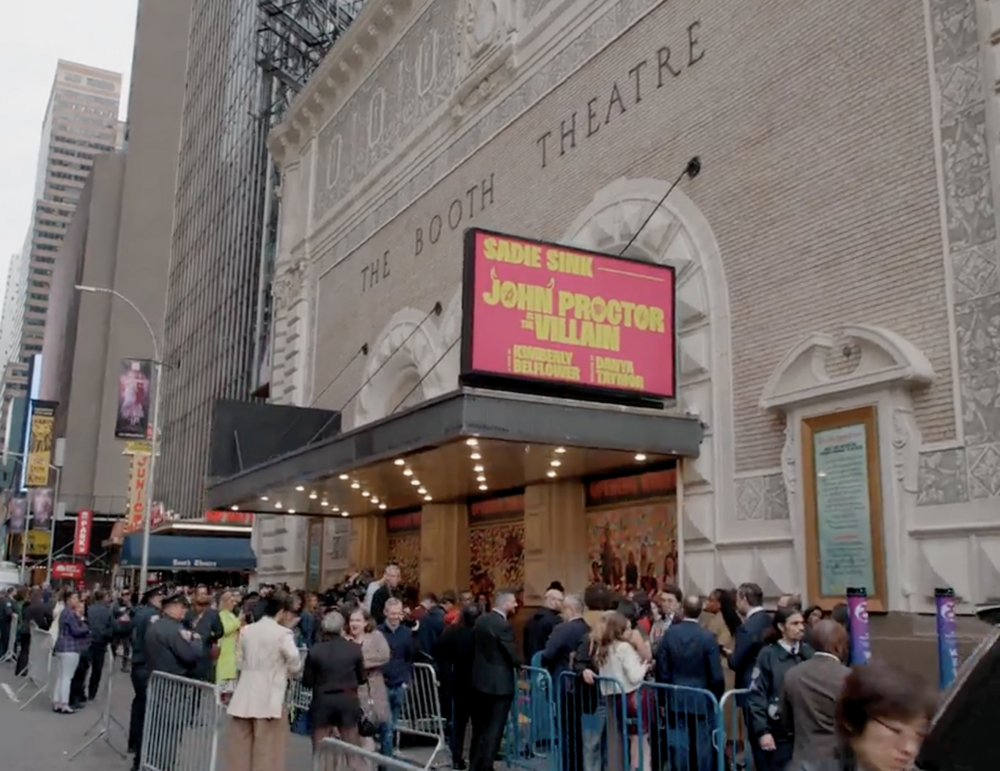
Caption
Crowds arrive to attend the Broadway play John Proctor is the Villain on its opening night, April 14, 2025.
Credit: Courtesy of John Proctor is the Villain
A Georgia playwright and college professor is luring teens to Broadway with John Proctor is the Villain, inspired by a 70-year-old play and Y2K pop songs. GPB’s Kristi York Wooten tells us more, from New York and Atlanta.

Crowds arrive to attend the Broadway play John Proctor is the Villain on its opening night, April 14, 2025.
Excitement was in the air as theatergoers snaked through Schubert Alley on a wet May Tuesday in Manhattan, ahead of the evening performance of John Proctor is the Villain at the Booth Theatre.
Georgia native and Emory University professor Kimberly Belflower wrote the play, which gained notoriety for adding a “Me Too” twist to Arthur Miller's allegorical 1953 classic The Crucible.
Miller's protagonist Proctor is not a character in Belflower's play, but The Crucible's framing of a witch hunt informs her narrative about a group of North Georgia high students in 2017 who are dealing with trauma — and questions about their teacher.
"What if both things can be true?" Belflower, who turns 38 on June 22, asked in a video conversation with GPB from New York earlier this month. "What if multiple things are true at the same time? What if, in The Crucible, John Proctor does take very moral, essential stands against falsehoods and — and also he's incredibly misogynistic and abusive to the other women in the play? And just like in my play, you know, Mr. Smith, the teacher character, he's a great teacher. He has positively impacted many lives of his students over the years. And also he is a predator."
John Proctor is the Villain is directed by Danya Taymor and features 22-year-old Sadie Sink (a regular in the Atlanta-filmed Netflix hit Stranger Things) as a student who returns to school after a mystery absence and a cloud of rumors. Although the play received seven Tony nominations yet took home no hardware at the awards ceremony June 8, its fictional portrayal of power dynamics and sexual assault has electrified discussions around how young women process their experiences.
"I think seeing all of these characters that you can relate to, and you can kind of pick out who represents you the most, that's really powerful to see happen, " Sink told media on the red carpet on the play's opening night. "And also just the overall message. It's just all like a real celebration of girlhood."
The play's sound design — before, during and after the production — is a primary factor in its lure for teens and their parents. At their seats during that May performance, families chatted loudly over a pre-show playlist of hits from the 2010s, and when Robyn's “Dancing on My Own” ramped up, a multi-generational sing-along ensued.
Yet John Proctor is the Villain is not a musical. Belflower said the recorded music connects with the emotions of the play but the real meat is in the dialogue, which was inspired by what she heard in her own high school while growing up in Georgia's White County. For this reason, she assigned Southernisms to her characters but was careful not to burden them with stereotypes.
"When I'm writing about Southerners and when I'm writing about teenagers, I just love both of those populations of people so much that I feel like it's not a huge effort to depict them with humanity and dignity and complexity because that's how I see them," she said. "Because that how they are. Then when I am workshopping a script, and this script in particular, I'm always very conscious of how people who are not from the South encounter these characters. And so I want to make sure, like, 'Oh, is there anything that I just wasn't conscious of?' as I'm kind of mapping out the world."
The climax of the play arrived in the form of New Zealand singer Lorde's 2017 anthem “Green Light,” in which the traumatized yet newly liberated classmates dance wildly to pulsating lights.
This is the moment in John Proctor is the Villain that taps into a pre-COVID pandemic mood of America — one that evokes deep feelings about the current state of the world, especially for women of all ages. As the groove bounces, the theater is so thick with pheromones and realizations of empowerment, attendees leave the play feeling like they just left hot yoga with an agenda.
"What that song means to me is like what it is to be an artist and to move through something painful or traumatic and reach the other side of that experience and be like, ‘Oh, I'm going to make something out of that. I'm going to like harness my pain and turn it into something good,’" Belflower said. "And I think that's what Shelby and Rae Lynn, the characters in my play, are doing in that final moment there, you know, really have realized, like, the institutions aren't going to protect us. The school didn't protect us, our parents didn't protect us the church didn't protect us. So, like, we have to show up for each other."
Belflower said she has been living in a bit of a dream world since John Proctor is the Villain took off.
She wore an amazing fuchsia dress and took her best friend to the Tony awards because they promised each other in high school they would go together is either was nominated.
A semester of sabbatical in New York allowed her to bask in her play’s kudos, including praise from The New York Times, in which a columnist wrote she “couldn’t stop thinking about it for weeks.”
What's next for the playwright who can't wait to return to her home state and be reunited with the students who inspire her work? A full-time slate of fall classes in theater studies and dramatic writing on Emory’s campus in Atlanta.